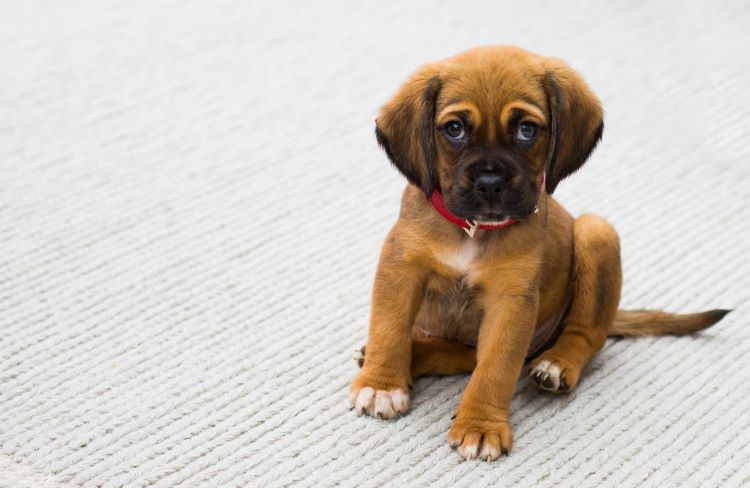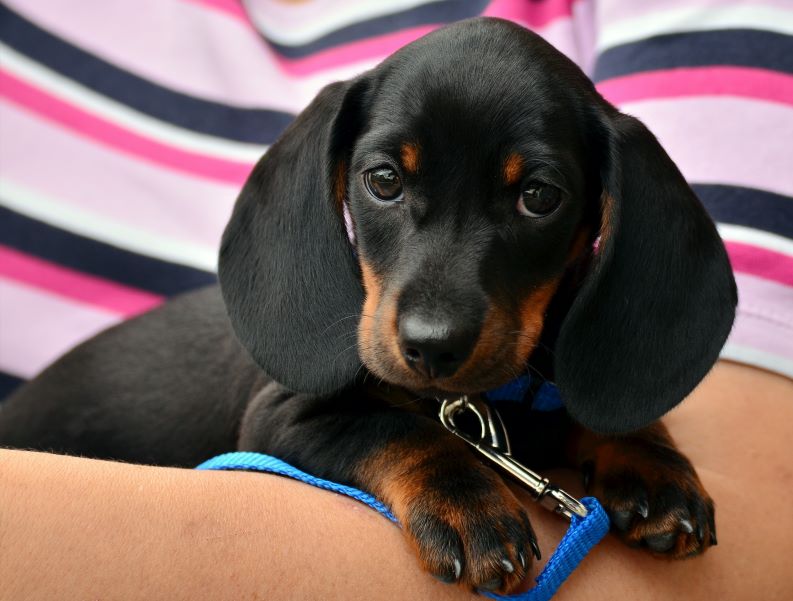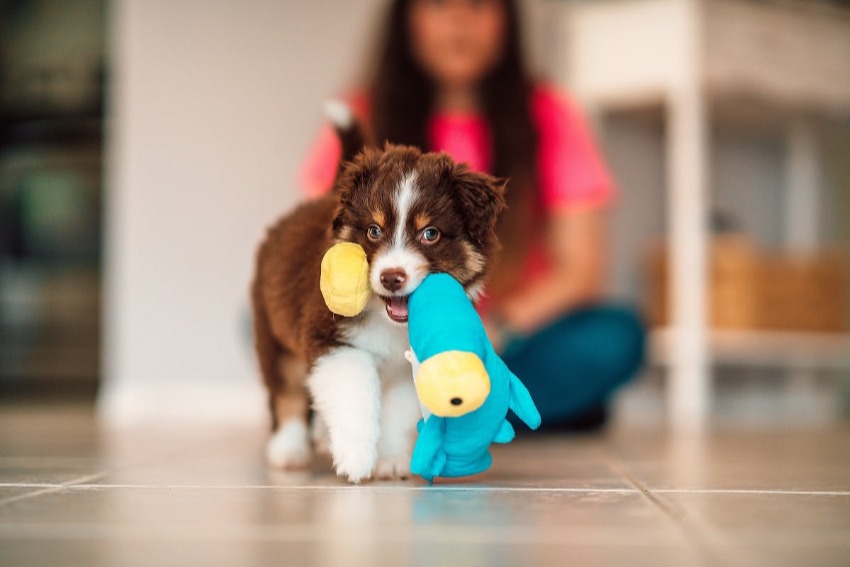Ready to help treat your pet to a healthy life?
A Guide to the First 48 Hours with a New Puppy
By : Kelli Rascoe & Trupanion Staff | Updated Jan 2, 2024

The first 48 hours with a new puppy is an exciting time for your family, but it also comes with its fair share of challenges that must be navigated correctly. Whether you are a seasoned pet parent or a brand-new puppy owner, every pet you introduce into your home is going to bring about a unique experience. The first 48 hours with a puppy are crucial for setting the tone for a smooth transition and establishing the foundation of a strong pet-human bond, so it's important to know what to expect.
As with any new situation, your puppy is likely to react differently upon meeting people, places, and things, though the first two days in a new home can be particularly overwhelming. In this guide, we'll walk you through some essential steps to make those initial moments with your new puppy as seamless and memorable as possible.
Preparing your home for a new puppy
Little puppies are curious and certainly love to explore and roam, especially when they suddenly find themselves in a new space. So, before you even bring your newest family member home (or immediately right after doing so, if you already have your pet with you), make sure you have the right environment set up for them. This includes investing in new puppy supplies, puppy-proofing against house hazards, and of course going over important ground rules with all family members (including children).
Must-have new puppy supplies
Now's a good time to make sure you have the right pet care items and puppy supplies ready for your new pal. While your exact needs may vary depending on your pet's breed (which can affect grooming needs and health risks) and where they're coming from, all puppies will need the following items:
- Leash and collar / puppy-sized harness
- Food and water bowls
- Safe toys that cannot be swallowed or easily torn apart
- Dog food rated specifically for puppies
- Comfortable bed
- Dog crate
Discover what other new puppy supplies you may need.
Puppy-proofing your space
Remove any potential hazards before you bring your puppy home for the first time. If you're reading this after the fact, better late than never! Simply keep your puppy somewhere secure while you go around and take care of potential puppy dangers. Specifically, you'll want to do the following:
- Secure electrical cords with covers and clips. Consider using a deterrent spray in areas where you cannot completely tuck cords away and out of reach.
- Start keeping toilet lids down if you do not already do so.
- Protect against your puppy eating harmful substances by switching to trash cans with lids that can't be knocked off or place trash cans inside closed cabinets.
- Clean up all small, loose objects and keep in closed containers. Leave nothing loose out.
- Get a pet gate (baby gates work well here) to restrict your puppy only to designated safe areas within the home. Putting gates at the top and/or bottom of staircases is a good idea, as young puppies can easily slip and fall when trying to use steps.
- Barricade any small spaces that puppies could wander into and get stuck — behind appliances and under furniture, for example.
- Put all houseplants high up and out of reach of curious puppy noses and paws.
- Secure all household cleaning items in a cabinet or closed container that can't be opened without human hands.
- Designate a cozy, safe space for your new friend to retreat to when needed (dog crates work well for this purpose).
- Create an at-home pet first aid kit.
Establishing house rules
Rules aren't just for puppy training! To ensure the safety of humans and animals alike, it's a good idea to go over the following rules with everyone living in the home:
- Never leave puppy unattended outside or inside.
- Keep puppy in the designated "safe zones" of the house until it is agreed they are ready to expand to other areas.
- Clean up after yourself from every activity, never leaving anything out that puppy could get into.
- Do not take puppy outside unleashed.
- Don't feed puppy table scraps or any other human food.
- Clean up any puppy accidents right away and take puppy outside as soon as they start doing "the stance."
In addition to these rules, you'll also want to establish puppy feeding times and discuss how frequently your new pet will need walks and potty breaks. You'll also want to determine who is responsible for what aspects of puppy parenting as well as basic stipulations, like whether or not they will be allowed on furniture.

Navigating the first two days with a new puppy
Going beyond puppy-proofing your home, the first 48 hours with a puppy will keep you busy. If you already have experience with dogs, it's worth noting that puppies typically require more of everything: more engagement, more naptime, and more potty breaks. And because they're growing so quickly, puppies also require more frequent feeding times.
Being armed with this knowledge will help your initial days with your puppy go more smoothly, but be prepared for surprises. After all, this time is also when you'll get to know your puppy's unique personality a little better and lay the groundwork for many happy years together.
The first introduction
If you're bringing your puppy home for the first time, you've likely already "met" them at the shelter or breeder. Regardless, take time with all new human introductions, allowing the puppy to smell you first and enjoy some pets before attempting to pick them up or get closer.
When you bring your puppy into their new home, introduce them to the environment gradually. Allow them to explore one room at a time, offering gentle encouragement and positive reinforcement. Keep interactions calm to help alleviate any stress or anxiety your puppy may be experiencing.
Meeting other pets
If you already have other pets at home, take things slowly when introducing them to your new puppy. They do not need to become best friends within 48 hours. In fact, you may want to keep them separated for the first day or so, "introducing" them to one another by sharing their scents (via toys and blankets that they've each spent time with). Monitor initial encounters closely, and never leave pets unattended with each other.
The first night
Your puppy's first night in their new home can be stressful due to the drastic change in environment. It's a good idea to keep them in their crate (preferably the one they arrived in) with a cozy blanket rather than inviting them to sleep elsewhere. Due to their small size and because you have not bonded yet, it's not recommended to have your new puppy sleep in your bed. Be sure to get up early to let them out for a potty break!
Socialization and bonding
The first 48 hours with a puppy are when you'll start bonding with them through a series of positive interactions. Spend quality time playing, cuddling, and gently introducing them to other family members. Early socialization is essential, so expose your puppy to different environments, sounds, and experiences in a controlled and positive manner.
Keep in mind that not all new puppies will be friendly right away. Some will feel very anxious at being in a new environment, especially if there are multiple new people or other pets involved. This is why it is so important to have a safe, quiet space set up for them to retreat to as needed. Don't force new interactions if your puppy is showing signs of stress — give them space, and avoid holding / picking up puppies showing aggression or anxiety. Approach each situation with love and understanding, and you'll eventually be rewarded with a happy and well-adjusted pet.
Starting basic commands
The first two days with your puppy may feel a bit early to start dog training, but the sooner you start, the better the outcome is likely to be. In fact, it's advisable to start basic training from day one. Begin with simple commands like sit, stay, and come, and use positive reinforcement techniques (treats and praise). This early training will not only help with obedience but will also strengthen the communication between you and your new companion.
Addressing puppy health needs
Sure, finding a veterinarian may seem not as important (or as exciting) as the other items on the list of things you should do within a puppy's first 48 hours home. However, it's vital. Even if coming from a breeder or shelter with a veterinary record, new puppies should be checked out by your own veterinarian as soon as possible. They can help verify their health record and ensure their vaccinations are current, not to mention spot any potential early health issues.
In fact, once you know what kind of a puppy you're getting, it's a good idea to talk with a veterinarian about their specific health needs, including what kind of food is best for them. This is also an opportunity to find a veterinary office you trust and set up your pet's initial appointments.
In addition to finding a veterinarian for your new puppy, you'll also want to sign up for dog health insurance as soon as possible. Doing so will decrease the likelihood of having pre-existing conditions that are not covered, setting your pet up for a lifetime of quality healthcare.

Stay patient with puppies during the first 48 hours
The first couple of days with a new puppy are exciting and maybe even a bit nerve-wracking. But above all else, it's important to practice patience. No new pet is going to get everything right the first time when it comes to house rules or even meeting other animals and humans. The best thing you can do is reinforce the rules, double-check your house puppy proofing standards, and stay calm with your newest addition. If you suspect anything is wrong, contact your veterinarian.
By having the proper pet care items and checking with your vet, your new puppy will be accustomed to their new home and family in no time at all.
